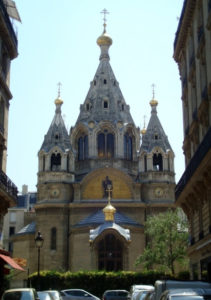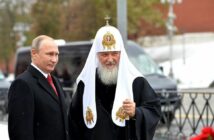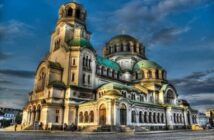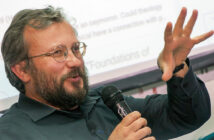
St. Alexander Nevsky Cathedral, Rue Daru, Paris
Source: Archdiocese of the Russian Orthodox Church of Western Europe
The Archdiocese of the Russian Orthodox Churches in Western Europe, which is one of the oldest Orthodox ecclesial entities of our region, was placed under the pastoral responsibility of Metropolitan Euloge (Georgievsky) by St. Tikhon, Patriarch of Moscow, by decree of April 8 1921.
Thrown on the roads of exile by the Bolshevik Revolution, Russian emigrants established, with faith and courage, an ecclesial presence based on the major principles of the unfinished Moscow Council of 1917-1918.
First established in Berlin, the seat of the Archdiocese was transferred to Paris, to the Saint-Alexandre-Nevsky Cathedral, and took the form of an association under French law, composed of communities and parishes established in France. throughout Western Europe, and remains so to this day. The statutes of this association, the Diocesan Director Union of Russian Orthodox Associations in Western Europe, were deposited in the prefecture on February 26, 1924 and are still in force today. In 1931, in order to guarantee its independence and durability, the Archdiocese asked to depend on the Ecumenical Patriarchate of Constantinople, which was accepted by a patriarchal and synodal tome of February 17, 1931, which gave the Archdiocese the status of Temporary Exarchate of the Ecumenical Patriarchate.
On November 22, 1965, the Ecumenical Patriarchate unexpectedly announced to the Archbishop the withdrawal of the provisional Exarchate status of 1931. The Archdiocese then found itself independent of any patriarchy. It was conducted during this period by Archbishop Georges (Tarassoff), the archbishop-ruler from 1960 to 1981. On 22 January 1971, by patriarchal and synodal letter, the Ecumenical Patriarchate once again accepted the same archbishopric in its bosom, but not granting him precise canonical status within the Patriarchate itself.
Archbishop Serge (Konovalov) undertook to negotiate with the Ecumenical Patriarchate a revision of his canonical status within the Patriarchate. This culminated in the granting of the Patriarchal and Synodal Tome of June 19, 1999, by which the Holy Synod of Constantinople, at the formal request of the Archdiocese, following several years of internal debates at the Archdiocese and negotiations with the Holy Synod of the Ecumenical Patriarchate, gave a status of Exarchate (non-provisional) to the Archdiocese.
It is this status that the Holy Synod, however without prior consultation with any official organ of the Archdiocese, has just revoked, by a decision of November 27, 2018.
–
By its unexpected nature, the Synodal decision of the Patriarchate of Constantinople to revoke the volume of June 19, 1999 calls for a deep reflection within the Archdiocese. Nevertheless, it is essential not to respond with brutality to this decision.
Indeed, as the orthodox ecclesiology of great contemporary theologians such as Metropolitan John (Zizioulas) of Pergamos or Father Nicolas Afanassieff teaches, it is around their diocesan bishop that the communities and the faithful constitute the Church in its catholicity.
“Several Orthodox synods produce encyclicals and directives pertaining to the internal affairs of a diocese, as if the synods constituted a” superior “authority in the Church. Some Orthodox theologians even argue that the synod is the supreme authority of the Church, thus creating a hierarchy with a diocese at its base, above which one finds the regional synod and the ecumenical council representing the supreme level. Does a council or synod constitute a structure situated above the bishop? The answer to this question can only be negative from the ecclesiological point of view. Ecclesiologically speaking, there is nothing superior to the bishop in the Church “[The bishop according to orthodoxy, in the book of Metropolitan John (Zizioulas) of Pergamum, The Church and its Institutions, Paris, 2011, p. 386-387].
Therefore, to be able to hatch the authentic voice of the Archbishop, we must remain united around the Archbishop, His Eminence Jean de Charioupolis. In fidelity to the original identity of the Archdiocese, this consultation around the leading Archbishop will take place in the bodies instituted by our statutes which have been approved by the Holy Synod: first within each parish or community but also in statutory clerical-lay assemblies.
Any ecclesial decision, to be effective, must be formally received by the entity that is subject to this decision, especially when the decision has not been requested by those who must implement it. Monseigneur Jean, as the Chief Archbishop, will be able to respond to the synodal decision, in respect of the catholicity of the Church and the statutes of the Archdiocese, only at the end of the following deliberative procedure.
Archbishop John invites the priests of the Archdiocese to a pastoral assembly on December 15, 2018, to confer with those who carry with him the spiritual responsibility of the parishes and faithful of the Archdiocese.
In the wake of the pastoral assembly, the Council of the Archdiocese will formally convene a general assembly of the Archdiocese, which will be attended by all the clergy and lay delegates elected by the parishes and communities, which are the member associations of the Diocesan Union.
By virtue of its roots in Western European societies, the Archdiocese assimilated certain elements of Western culture, including an attachment to democratic values, the fundamental rights of individuals and the freedom of each individual, as well as the principle of contradictory debate prior to any decision. Clerics and communities who would like to leave the bishopric to join another episcopal jurisdiction than that of Archbishop John will have to proceed according to the canonical order and ask leave of the Most Reverend Archbishop Jean de Charioupolis. Our preference, however, is for dialogue and dialogue in truth, in a regular deliberative assembly of the whole diocesan union.
It should be pointed out that, at the canonical level, Archbishop John, as the Chief Archbishop, neither called for the repeal of the exarchate statute, nor his own retirement. He therefore remains fully in pastoral charge of the Russian Orthodox Churches in Western Europe.
In anticipation of the response that Archbishop Jean de Charioupolis will be able to give to His All-Holiness the Ecumenical Patriarch Bartholomew of Constantinople and their Eminences the Members of the Holy Synod, as a result of the transparent procedure outlined above, the Clerics of the Archdiocese are invited to continue the following liturgical commemoration: “For His Holiness the Ecumenical Patriarch Bartholomew of Constantinople and His Eminence Archbishop John of Charioupolis, Chief Archbishop of the Russian Orthodox Churches in Western Europe”.
With confidence in the action of the heavenly King, Comforter, the Holy Spirit, we invite all the faithful to prayer for the prosperity of all the Churches of God.



